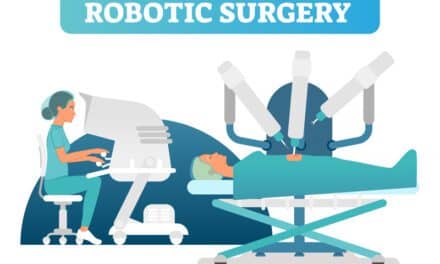Dublin-based Medtronic plc announced the first patient was implanted in its ELITE study of the InterStim Micro system, which does not require explanting for an MRI.
Medtronic says the InterStim Micro features SureScan MRI technology, which does not require impedance checks prior to an MRI scan, providing more efficiency in patient care versus the other SNS system on the market.
ELITE is the only study of a rechargeable sacral neurostimulation (SNS) system to include all SNS indications for symptoms of overactive bladder, including urinary urge incontinence (UUI) and urinary frequency (UF), as well as non-obstructive urinary retention (NOUR) and fecal incontinence (FI). Keith Xavier, MD, FPMRS, a founding partner of Urology Partners of North Texas (UPNT), implanted the patient, who suffers from overactive bladder.
“Millions of adults in the U.S. suffer from bladder and bowel disorders,” says Xavier. “Through the ELITE study, our goal is to further validate existing data that sacral neurostimulation is a safe, long-term solution for patients who are limited professionally, personally, and socially1 by their condition.”
ELITE is the first rechargeable SNS study to include fecal incontinence, which is significant because nearly 20 million adults have fecal incontinence,2,3 and approximately 11.5 million adults suffer from both OAB and FI.3,4 Separately, more than 37 million adults in the United States suffer from overactive bladder (OAB).5,6 For patients suffering from fecal incontinence, there are few treatment options. Sacral neuromodulation is one of the only effective treatment options for patients suffering from FI, or from both OAB and FI.7
The Evaluation of InterStim Micro System Performance and Safety (ELITE) study will enroll 160 subjects across 40 sites in the United States (and territories), Europe, Australia, and Canada. Endpoints include patient reported outcomes, disease specific quality of life questionnaires, and symptom diaries. Patients will be followed for two years.
The InterStim Micro is 50% smaller than the market’s other rechargeable SNS device, making it the world’s smallest. It allows patients to choose how and when they want to charge their device — from a quick charge once a week, or as infrequently as once per month, depending on the patient’s preference or device settings. InterStim Micro can recharge from zero to 100% in less than an hour*, making it the fastest battery available, and reduces the need for battery replacement surgeries due to its life of 15 years. The InterStim systems have been implanted in more than 325,000 patients and represent the only SNS technology backed by 5-year clinical data.
For more information, visit Medtronic.
Featured image: Medtronic’s InterStim Micro features SureScan MRI technology, which does not require impedance checks prior to an MRI scan. (Credit: Medtronic)
References
1 Leede Research, “Views on OAB: A Study for the National Association of Continence.” December 16, 2015.
2 Whitehead WE, Borrud L, Goode PS, et al. Pelvic floor disorders network. Fecal incontinence in US adults: epidemiology and risk factors. Gastroenterology. 2009;137: 512-517.
3 United States Quick Facts. United States Census Bureau Web site. Available at: https://www.census.gov/quickfacts/table/ PST045215/00. Accessed July 19, 2016.
4 Coyne KS, et al. The prevalence of chronic constipation and fecal incontinence among men and women with symptoms of overactive bladder. BJU Int. 2011 Jan;107(2):254-61.
5 Stewart WF, et al. Prevalence and burden of overactive bladder in the United States. World J Urol. 2003 May;20(6):327-336.
6 United Nations, Department of Economic and Social Affairs, Population Division (2011). World Population Prospects: The 2010 Revision, CD-ROM Edition.
7 Faucheron JL, Chodez M, Boillot B. Neuromodulation for fecal and urinary incontinence: functional results in 57 consecutive patients from a single institution. Dis Colon Rectum. 2012 Dec;55(12):1278-83.






